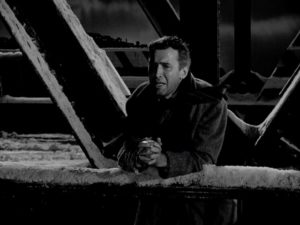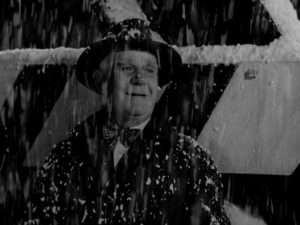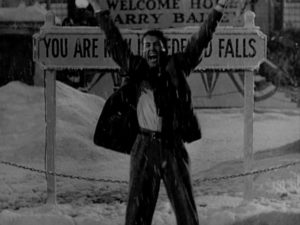It’s a Wonderful Life (1946). Written and directed by Frances Goodrich, Albert Hackett, and Frank Capra. Starring James Stewart, Donna Reed, Lionel Barrymore, Thomas Mitchell, and Henry Travers. 130 mins. Rotten Tomatoes: 94%.
It’s a film that supposedly everybody knows, and loves, hauled out each Christmas ad infintum in ever-so-boring bleached out copies. It’s an easy sentimental rush, though familiarity has by now even made that harder to achieve. It has pretty much worn out its welcome, though it did not get much of one in the first place. It’s a Wonderful Life (1946) was not a box-office success, largely passed over for praise even though it starred Jimmy Stewart fresh back from the Great War and was written and directed by the much-loved Frank Capra, war documentarian and master of crusading social comedy.
The film is masterful, beginning to end, possessed of a high comedy throughout, meaning ample surprise and delight (this notion comes mostly from Frederick Buechner in his remarkable Telling the Truth: The Gospel as Tragedy, Comedy, and Fairy-Tale). That said, it also plumbs the depths of despair as poor George Bailey (Stewart), a loving husband and father of four, crashes to an existential nadir that goes just about as deep into forsakenness as one could go. Next step, hell itself. So far, in fact, that his personal deus ex machina finally shows up just in time, for desperate George is about to leap to doom in the icy river that runs through the smallish city of Bedford Falls.
And then George goes on the trip, or rather detour, of his lifetime. Various events have conspired to bring George to feel that his life has been a complete disaster, fearing as he does that he will soon be ignominiously imprisoned for theft since his small savings and loan bank has misplaced a tidy sum. So George stands amid wind, dark, and snowfall at the bridge railing, prepping himself for the plunge, his haunted desperation made more than clear by Capra’s stark cinematography.

And, in the fortuitous nick of time, happily, along comes dithery Clarence, the angel who’s working hard to earn his long-overdue wings by actually helping someone. For all of his kindly jollity, he’ll give George a hell of a trip, and then some.

Clarence will show George what the life of those beloved Bedford Falls folks would have been like if he had not been here: mother, brother, wife, uncle, and townsfolk. In a way George’s journey is the reverse of Scrooge’s terrifying glimpse of the future. Scrooge wonders what he can fix; George recognizes the difference he has made, from once rescuing from drowning his little brother (who matures to become war hero fighter pilot who saves countless lives) to keeping his half-daft alcoholic Uncle Billy from guilt-ridden insanity. Throughout this tour, Clarence is a tough but kindly guide, but finally, sensibly, thick-headed George gets it. Really truly. And, of course, what he sees he should have seen all along, but being what he is, namely human, he doesn’t.
Then, though, the smash and bang of the obvious pummels him, however belatedly, into giddy, gladsome, and irrepressible gratitude, a joy that comes unexpectedly as from a far country which George, at least in this phase of his life, had forsaken, albeit for some good reasons. What is remarkable to witness, for we don’t see it very often, in ourselves or others, is the radical exuberance at the return of the ordinary commonplace of the present or, perhaps more accurately, Presence, the sustaining grace that upholds the splendor of this world, a note on which Calvin was absolutely insistent, no matter how his followers have buried it. In realizing the enrichment of the lives of others, George seems to recognize the incalculable intrinsic goodness of his ordinary existence. Then, exultation, sprinting wildly down snowy main street shouting his greetings to everyone and everything, including arch enemies like Mr. Potter (John Barrymore), the man determined to devour George’s humble business.

Now suddenly, seeing the world as God sees it, all things, suddenly, mysteriously, assume a wholly different guise. Instead of mire, dark, and doom, all—and quite literally all–turn “bright and beautiful,” bespeaking a beneficent fruition of knowledge and beauty, “wise and wonderful,” again quoting the hymn.
In sum, in finally seeing how he has benefited (blessed) so many others, George’s wild, crazed vision now goes so far as to see all things as blessed, himself included, and in turn he blesses all and everything. For George Bailey, at last, it feels good to feel care, for himself and for others and all being. The radical vision of Capra displays the magnificence of the ordinary from the standpoint of its absence. Thanks be to George, and Clarence, Jimmy and Frank, and the Lord Creator, the well of all being and blessing.
Sign Up for Our Newsletter!
Insights on preaching and sermon ideas, straight to your inbox. Delivered Weekly!
Categorized into Joy, Life, Providence
It’s a Wonderful Life (1946)